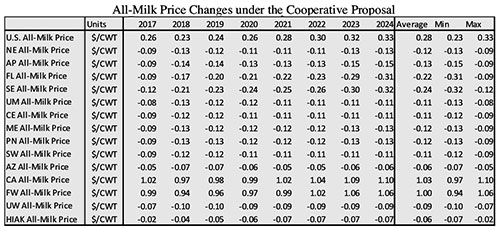
However, it comes as no surprise after seeing the department's 46-page analysis of projected economic impacts that a California FMMO would have on the country's current FMMOs. That analysis can be downloaded here.
For California producers, the report projects an average increase in total revenue of $1.03 per hundredweight ($700 million) per year under the proposal submitted by the state's three largest cooperatives.
(The estimated impact of proposals submitted by California's producer-handler group, by Ponderosa Dairy in Nevada, and by California's dairy processor organization, are also contained in the analysis. They appear in Table B20 on page 32, Table B36 on page 37, and Table B52 on page 42, respectively.)
Of the additional income figures projected under the co-ops' proposal the analysis says, "Given the current volume of milk production in California (in excess of 20 percent of total U.S. production), this increase would likely lead to lower uniform prices, lower milk production, lower All-Milk prices, and lower producer revenues across most of the rest of the United States."
An estimate of just how much lower is shown under the column heading "Average" in Table B4 on page 27 of the report, which also appears at the top of this page.
USDA's forecast shows that creation of a California FMMO would hurt producer prices everywhere except in the former Western FMMO that covered parts of Utah, Idaho, and Nevada. Prices there are forecast to go up $1 per hundredweight.
Meanwhile, prices everywhere else are projected to fall, with areas farthest from California generally affected the most. USDA predicts the biggest decline would be in the Southeast FMMO by an average of 24 cents per hundredweight per year.

The author has served large Western dairy readers for the past 38 years and manages Hoard's WEST, a publication written specifically for Western herds. He is a graduate of Cal Poly-San Luis Obispo, majored in journalism and is known as a Western dairying specialist.







